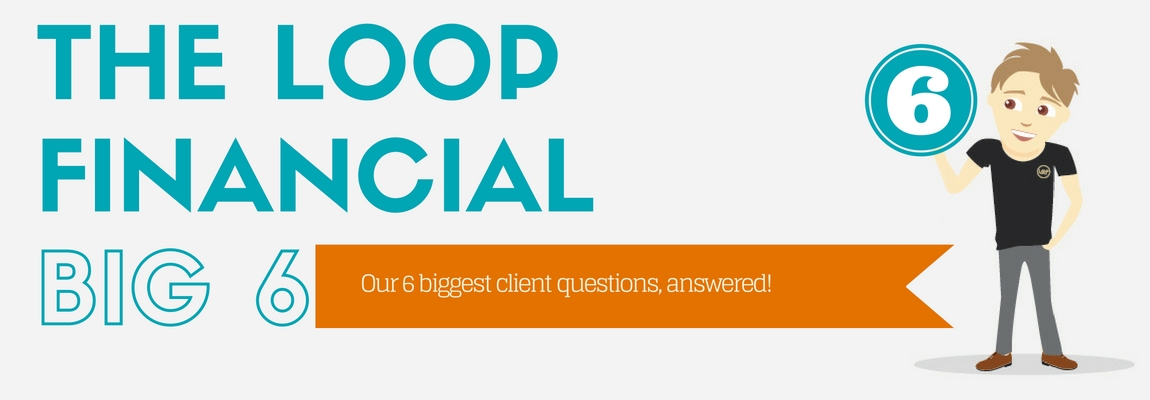What are the options for self-employed finance?
One of the Loop Financial Big 6 client questions, this time on self-employed finance.
Being self-employed is great for many reasons. Being your own boss, choosing your own hours, having more flexibility with your life, getting a greater sense of achievement, making more money… and you’ll probably have your own to add to that list if you’ve made the step into self-employment for yourself.
But there are downsides too, and one of the big ones is that it can be really difficult to get self-employed finance. Looking at things from the perspective of a bank, you can understand why they might not be jumping at the chance to lend you money when you have little financial stability and no guaranteed source of income. But this is of little comfort when all you want to do is establish your own business or get self-employed finance for a property investment.
What are the banks looking for from self-employed finance applicants?
Most banks and lenders require a minimum of two years of self-employment history to show that you have consistent income, that you are trading profitably, and that you are successful.
 From the bank’s point of view, if you can meet these traditional lending requirements, you’ll fall into the ‘traditional lending’ category which means you’ll have access to the same products and rates as a PAYG applicant.
From the bank’s point of view, if you can meet these traditional lending requirements, you’ll fall into the ‘traditional lending’ category which means you’ll have access to the same products and rates as a PAYG applicant.
Some lenders will consider self-employed finance on the basis of 12 months’ financials – one complete tax return – but remember that a self-employed tax year is traditionally six months to eight months behind a standard tax year, so we’re still talking about the best part of two years in business.
This lag in the assessment period can work for or against you, depending on how your business is trending; if your income is falling, it may be a relief that the numbers your bank is interested in are several months old. On the other hand, if your business has been thriving in recent months then it can be frustrating if the bank won’t take this into account.
The other thing to keep in mind is that most banks like to play it safe and will only allow for a 20% year-on-year increase. So even if you’re smashing it and business is going great, generating a massive increase in profit year-on-year, the bank will always be conservative and only allow for 20% in their assessment for self-employed finance.
What if I don’t meet the bank’s standard criteria for self-employed finance?
There are lending options for people who have been self-employed for less than two years, or even less than 12 months, but the bank still wants to see evidence that lending to you makes sense.
For example, a self-employed finance applicant may have been working in IT for 10 years before setting up his own IT business 12 months ago. Because he’s got the 10 years’ industry experience behind him, the bank will take that into consideration when making a decision. They’ll look upon that application more favourably than if, say, he’d decided to set up a dog grooming business instead (nothing against dog grooming, it’s just not exactly a natural follow-on from IT).
If you still don’t meet the bank’s criteria for whatever reason, there are some products, called low-doc products, which will allow you to access self-employed finance with minimal documentation to back you up.
For example, if you’re self-employed and you haven’t done your tax return for some reason, you may still qualify for a low-doc product if you can get a supporting letter from your accountant basically vouching for your financial situation.
You won’t be surprised to hear that the rates are higher for this kind of self-employed finance product though, and there is usually a big risk fee to pay, to offset the fact that the bank hasn’t been able to complete proper due diligence procedures to assess your finances.
You’re better off going through traditional lending avenues wherever possible, because you’ll get better rates and betterself-employed finance products, but low-doc products are always there as a backup.
What can you do to improve your chances of getting self-employed finance?
The good news is that by getting the right people on your side, you can give yourself a better shot at having your self-employed finance approved.
Lauren Mamaj, Finance Strategist and Chief Number Cruncher at Loop, explains that there are several ways you can make your finances look more appealing to a bank if you’re self-employed and need a loan, whether it’s for a property investment or something else.
Say, for example, your 2015 profit is $100,000 but your trending profit for the year ending 2016 is going to be $200,000. There are ways you get your bank to take this into account even though they would usually only look at the last complete financial year.
“If we can evidence, or show some consistency via BAS statements or an accountants letter or some interim statement [of your forecast profit for] the year ended 2016, you can maximise your borrowing potential based on the fact that you’re trending at a higher income level than 2015,” says Lauren.
When you’re self-employed, you’re usually looking for ways to minimise the tax you pay so you write off as much as possible against your profit. But this can count against you when your bank looks at your headline numbers.
Let’s say your profit and loss balance sheet shows that you have generated $200,000 in sales or income but you have $250,000 in expenses, resulting in a loss of $50,000. Most mortgage brokers will stop there and refuse your self-employed finance application because they’re not going to lend money to someone who’s trading at a loss.
A closer look might reveal that you have paid yourself a director’s fee of $100,000, you’ve made additional super contributions, or you’ve written off a sum to account for depreciation. Your mortgage broker can add these amounts back to your bottom line (we call these ‘add-backs’), putting you in the positive income position that the bank needs to see for self-employed finance.
Similarly, if your accounts show drastic fluctuations from year to year then this will be a big red flag to your bank. But it might just be that you’ve taken on additional staff, invested in new equipment, or had some other one-off expense. If you can provide evidence of this and justify the figures in a way that makes sense, the bank can often have discretion on what they’ll approve.
“The key is to work with a broker that actually understands self-employed financials,” explains Lauren. Every bank has a checklist to follow, but you want a mortgage broker that will look beyond the checklist and has the specialist skills to understand your personal finances.
Lauren says that in an ideal world, your mortgage broker will work with your accountant to plan ahead according to your financial needs. If you know your aims for the coming year then you can make sure your accounts put you in a strong position to get what you want, along with any supporting letters that may be required.
In reality though, despite the fact that many mortgage brokers are themselves self-employed, most have a limited understanding of P&L and balance sheet accounting so can’t add much value for clients who are seeking self-employed finance.
Your loan acceptance is highly dependent on your broker and that’s why it’s so important to find the right one if you’re planning to invest in property. Lauren suggests asking plenty of questions, such as: Have you worked with self-employed applicants? What’s your success rate with approvals? What’s the balance of your portfolio with self-employed applicants? Do you work for accountants?
Ask whatever you need to feel comfortable that the broker will do the best job possible on your behalf.
“Experience and skill set are critical,” says Lauren. “I personally worked with an accounting group for six and a half years and I was trained in financials, self-employment, structures, strategy, bucket companies, distributions, add-backs, and asset protection so I gained that experience.”
This experience gives Lauren an extra layer of knowledge, which can keep clients one step ahead in the process and ultimately save them time, money, and hassle. Viewing things from a credit perspective, Lauren can flag lines in a P&L that a client needs to query with their accountant. There may be errors which mean the client is due a refund, or anomalies which the finance provider is bound to query.
“You need to have that middle person to vet your situation and put forward the best possible case of being approved,” Lauren says, but it’s this extra preparatory work that puts many brokers off working with self-employed finance applicants.
The banks need this additional information because they see self-employed applicants as higher risk than those employed by a company, but because brokers are remunerated by commissions, they are essentially doing the extra work for no extra income. You can’t really blame them for not being too enthusiastic about this.
Where can Loop help you with self-employed finance?
 If you feel like your chances of finding a broker who will do all this for you are one in a million, then Lauren and her team at Loop can offer a helping hand.
If you feel like your chances of finding a broker who will do all this for you are one in a million, then Lauren and her team at Loop can offer a helping hand.
In contrast to a broker who works on commission, Loop calculates a fee based on your specific requirements. “When we have an applicant where we know there’s going to be quite a lot of work involved and we know that it’s going to take an additional month or two months to get them packaged correctly to achieve that approval, we’ll quote a fee for that,” explains Lauren. “We’d only quote if we’re confident that we can actually get them across the line by putting them in the best possible scenario.”
So you’re paying the fee in return for maximised borrowing capacity, and the peace of mind that someone is looking after the process and you won’t end up feeling like a ping pong ball bouncing between your accountant, mortgage broker, and finance provider.
Lauren has had plenty of self-employed finance clients who have been hesitant about going through the process. “I think what deters self-employed applicants is that they’ve been put through the ringer with a bank manager or with another broker who might not have understood their situation,” she says.
How can you plan ahead with your taxes?
One of the key areas that Lauren looks at with clients is tax planning.
Remember how we said that writing off all your profit to save on taxes isn’t always the best strategy? Minimising your taxes will save you money in the short term but may impact your long-term wealth prospects or retirement planning. If you want to purchase an investment property or access financing to build your business, you need to prove you have increasing income and that will mean paying some tax.
If you’re planning a property investment within the next couple of years, then your accountant needs to be aware of this so they maximise your profit on your balance sheet, showing your bank that your income is sustainable. Yes, you’ll have to pay more tax, but if it means you can access the level of finance you for your investment then it’ll pay off in the long run.
In years when you’re not planning to apply for a loan, your accountant can write off as much as possible on your tax return to minimise the tax you pay. This can include paying for some expenses in advance for the following financial year but writing them off against the current year. It’s all about having someone with knowledge of the system who is prepared to spend the time planning ahead.
“Having a good broker working with your accountant proactively in advance of the financial accounts being completed, not after they’re being filed, is pretty critical,” says Lauren. “We normally recommend with our self-employed clients, they should be doing tax planning every three to six months with their accountant, just so we can do what we call profit checks on how they’re trending, how they’re tracking. We flag areas with the accountant, we actually educate accountants on finance and what the banks look for.”
Did you know you can even set your accountant goals for your balance sheet according to what your finance provider wants to see? For example, if you need to show a steady 20% growth year on year to be approved for a loan, you can talk to your accountant about that and get them to bring your profit as close to that figure as possible.
Are you starting to see how valuable it can be to have someone working for you who knows the system inside out?
If you’re struggling to get your head around all of this, don’t worry, because you don’t have to do it all by yourself. Have a chat with one of Lauren’s team at Loop and let us see how we can help you get to where you want to be!
Disclaimer *Your full financial situation would need to be reviewed prior to acceptance of any offer or product.
Credit Representative Number 482730 is authorised under Australian Credit Licence Number 389328.

